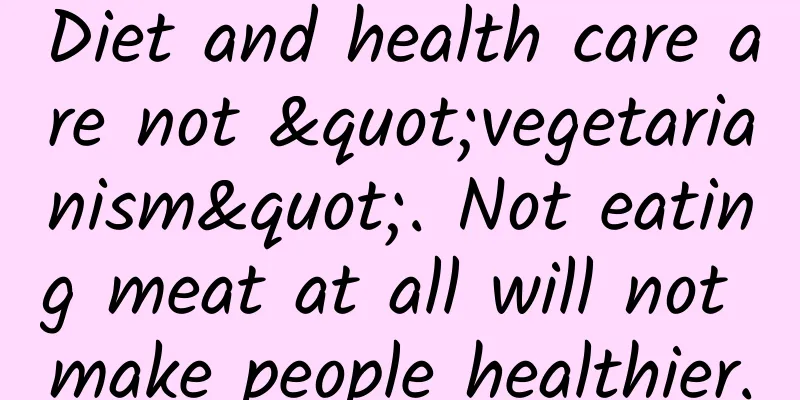Diet and health care are not "vegetarianism". Not eating meat at all will not make people healthier.

|
I ran into Mr. Liu in the community. He was looking worried. He told Huazi that he went to the hospital for a physical examination and was diagnosed with fatty liver. But his weight was normal and he had been a vegetarian for the past few years. How could he have fatty liver? Did he have liver cancer but the doctor was not willing to say it, so he used fatty liver to perfunctorily explain it to him? Huazi comforted Uncle Liu and told him not to worry, that the doctor did not lie to him, that he really must have fatty liver, and that the cause might be related to his vegan diet. 1. Vegetarians can also develop fatty liver. Among people with fatty liver, a considerable number of them are strict vegetarians. Why do vegetarians still develop fatty liver? This is because vegetarian food provides little calories, and vegetarians tend to eat more rice and noodles as staple foods. These foods are rich in carbohydrates, which will be broken down into a large amount of glucose absorbed into the blood, stimulating insulin secretion. Insulin allows tissue cells to use glucose, lowering blood sugar, and also promotes the synthesis of fat. Too much synthesized fat will accumulate in the liver, causing fatty liver. Moreover, when eating only vegetarian food, the intake of nutrients is incomplete, resulting in abnormal fat transport in the body, which can also cause fat accumulation in the liver. 2. Animal protein and iron are easier to absorb. Lean meat contains a lot of protein and iron. If you eat too little meat, you may suffer from protein deficiency and anemia. Although beans also contain protein and vegetables also contain iron, the absorption rate of plant protein and iron is relatively low compared with animal protein and iron. In 1985, a scholar conducted a survey on monks and nuns in Jiuhua Mountain and found that 55% of those who had been vegetarians for more than 15 years suffered from anemia due to iron deficiency. Vitamin B12 is only found in animal food such as fish, meat, and eggs. Insufficient intake can induce megaloblastic anemia, leading to abnormal sensation, memory loss, dementia and other neurological diseases. 3. Vegetarianism is not conducive to controlling blood sugar Sugar, protein and fat are the three major nutrients for the human body, providing energy for the human body. Protein and fat are mostly found in meat. Although beans also contain protein and fat, they are difficult to digest. Therefore, vegetarians usually eat vegetables such as potatoes, yams, pumpkins, lotus roots, and more staple foods such as rice and noodles to obtain energy. However, these vegetarian foods contain a lot of starch, which will eventually be broken down into glucose and enter the blood, becoming blood sugar, which will increase the burden on the pancreas. If people with diabetes follow a completely vegetarian diet, their blood sugar is more likely to rise. People with diabetes who eat a combination of meat and vegetables can more easily control their blood sugar. 4. Do not put a drop of oil in the dishes. A low-fat diet is recommended in the healthy way, but "cooking vegetables in water" without a drop of oil in the dishes is not healthy. Because what is recommended is "low" fat, not "no" fat. Many nutrients are fat-soluble and need to be dissolved in oil before they can be absorbed by the human body. For example, vitamin A, which plays an important role in the optic nerve, vitamin D, which promotes calcium absorption, vitamin E, which has an anti-oxidative aging effect, and vitamin K, which synthesizes coagulation factors, are all fat-soluble vitamins. If there is no oil in the dishes, it will affect the absorption of these fat-soluble nutrients and cause corresponding diseases in the human body. Therefore, a certain amount of oil needs to be consumed every day to ensure good health. 5. What is a light diet? A light diet usually refers to controlling the intake of fat, sugar, salt and total calories under the premise of adequate and balanced nutrition. Fat control: no more than 25 grams per day, eat vegetable oil, avoid animal fat, offal, and margarine. Salt control: no more than 6 grams per day, including "hidden salt" in processed foods. Control of sugar: no more than 25 grams per day, mainly referring to added sugar in food, including sugary drinks, snacks, pastries, etc. Each person can limit the total amount of food they eat according to their appetite, but they must maintain diversity to ensure balanced nutrition. Replace one-third of the staple food with whole grains and beans. Every day, you can eat half a pound of fruit, one pound of vegetables, drink half a pound of milk, eat one egg, drink 1800-2000ml of water, and eat two ounces of lean meat. This diet is healthier than a completely vegetarian diet. In summary, "vegetarianism" is a misunderstanding of diet and health, which will lead to the lack of nutrients in the human body, reduce the body's resistance, and induce diseases. A healthy and light diet means ensuring balanced and sufficient nutrition while controlling the amount of sugar, oil, and salt, and controlling the total calories consumed to avoid obesity. I am pharmacist Huazi, welcome to follow me and share more health knowledge. |
>>: Which panel of gas stove has good quality? How to improve the thermal efficiency of gas stove
Recommend
Should I break it or not? What should I do? - Sustained/controlled release and enteric-coated tablets
I often hear some patients complain that the tabl...
【Love Ear】Healthy ears·Scientific ear protection
March 3, 2022 is the 23rd National "Love You...
Is durian the king of fruits? What should I do if the flesh inside the durian is hard?
Durian is rich in nutrients and is the best nouri...
Will I have a fever when I'm pregnant?
The most common cause of body heat, other than hi...
Can I take a bath every day after giving birth? What should I pay attention to?
Pregnant women need to stay in confinement after ...
My breasts are sore but my period is not coming
Chest pain is most common in breast hyperplasia. ...
What to eat during pregnancy can cause miscarriage quickly
Pregnancy that ends before 28 weeks and the baby&...
After taking dydrogesterone, the endometrium is shed
Because during pregnancy, many women have low pro...
What are the effects of cooking fumes on pregnant women and fetuses?
After becoming pregnant, many pregnant women choo...
How to take a bus from Shanghai to Wuzhen for a one-day tour? Guide to Wuzhen for a one-day tour and itinerary arrangements
Wuzhen is a water town located in Tongxiang City,...
Can breast augmentation be felt?
Breast augmentation is very common in real life, ...
The protective umbrella of teeth - pit and fissure sealing
Creation and dissemination of oral science works ...
Can women take gold capsules during menstruation?
Modern people have a better understanding of drug...
Is it painful to have a medical abortion?
Nowadays, we often see many painless abortions. T...
Height 158cm and weight 100kg
Many girls try their best to lose weight in order...









